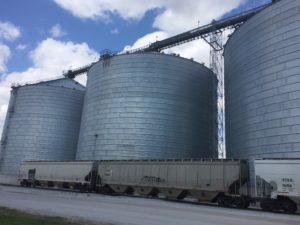5/26/17
POET is the largest, dry mill ethanol producer in the United States, with 28 plants in 7 different states. Today, we met with Kevin Monroe, a representative of POET who presented the values, initiatives, and production mechanisms of Jewell, Iowa’s plant. The fundamental goal for this corporation is to convert renewable resources into energy, which in this particular case would be corn into ethanol. The plant is also constantly looking for new ways to maximize the use of the corn kernel besides making ethanol, so that the good isn’t wasted. For example, after corn oil is extracted from the cornel to create biodiesel, the remaining parts of the kernel is used for food and feed for different farm animals across the state. It was also interesting to learn that each year, the need for renewable fuel increases, being more productive for the environment, engine health, human health, and value to the customers.
Since I am an Earth and Environmental Science major, protecting the Earth is something that I value deeply. The Earth is going to continue, but what happens when humans use all of its natural resources and can no longer function as a society? The main source of gasoline is petroleum, which is found as a naturally occurring liquid in particular geologic formations. Petroleum is not a resource that will exist forever and eventually, this source of fuel will be completely extracted from the Earth. The process of extracting this liquid, converting it into gasoline, and burning this gasoline for fuel is also extremely harmful for the environment, releasing a large amount of greenhouse gases into the atmosphere. POET provides a much more environmentally and economically safer method of creating an energy for fuel. Corn is a crop that grows in plentiful amounts. It is also a plant that humans can continue to grow forever, especially with the technology and equipment that is used in today’s agricultural methods.
Once Kevin finished presenting the core values of POET, we were fortunate enough to be able to have a tour of the plant, including seeing the different stages of the ethanol production. Something that came as a shock to me was the very few number of workers that appeared to be at the plant. In total, I only saw 4 POET workers at my time at the plant, including Kevin Monroe and the secretary who provided us with hard hats and safety glasses. The other two workers were walking in one of the production rooms, also wearing safety equipment. When comparing this observation to Hagie Manufacturing (who had more workers than I could count), I find it very interesting that the tractor company would need more workers than an ethanol production site. I am assuming this is because creating ethanol does not require much manual labor, but rather monitoring the process is only needed. Being able to see and learn about the process of creating ethanol was very rewarding to me and I’m sure the rest of my classmates. Hopefully with more time, more ethanol can be created to replace gasoline to better our environment.
